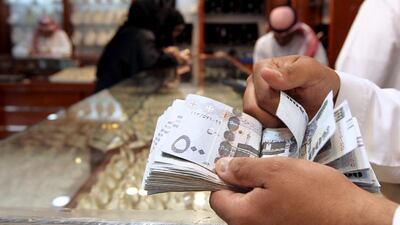Rating agency Moody's Investors Service assigned Arabian Gulf banks a stable outlook on the back of improving operating conditions, strong capital and weakening but still solid lending.
Banks in UAE, Kuwait, and Saudi Arabia will remain resilient but fiscal pressures will weigh on banks in Oman and Bahrain, where oil prices will remain below the levels needed to balance state budgets, Moody's said in a report on Wednesday.
"Current oil prices will support increased government spending, and stimulus packages such as UAE's Expo 2020, the Saudi National Transformation Plan...will underpin banks' stable financial performance," said Nitish Bhojnagarwala, a Moody's vice president and senior credit officer.
In June, Abu Dhabi announced a Dh50 billion three-year stimulus plan aimed at spurring economic growth, streamlining business procedures, creating jobs and boosting tourism. The government has since rolled out a series of measures to support new industries, ease visa rules, attract foreign investors and boost non-oil gross domestic product.
__________
Read more:
Sheikh Khalifa issues new law to raise UAE Central Bank capital to Dh20bn
Higher non-oil GDP prompts UAE Central Bank to increase 2018 growth forecast
__________
GCC banks' credit growth will recover as government spending stimulates the economies and spurs private-sector growth, Moody's said.
Lending growth in 2019 will range from 4 per cent in Saudi Arabia and 6 to 7 per cent in Kuwait, Oman and Bahrain, according to the report.
Banks' lending to construction and real-estate sectors will increase, it said. The property market in Gulf economies such as the UAE has slowed this year while sales and rents dropped.
Moody's expects nonperforming loans (NPLs) to stand at a "still good" 3 per cent of total loans at the end of 2019.
GCC lenders' capital will stay "broadly stable", benefiting from modest credit growth and stable bottom-line
profitability.
Pressures on profitability are expected to ease, with net income to tangible assets remaining strong at around 1.5 per cent to 2.1 per cent, it said.
"Banks have adapted their cost base to the slowing economic environment, maintaining strong efficiency," Moody's said. "Consolidation will ease competition and also alleviate some pressure on profitability."
Banks in the Gulf are increasingly looking to merge in a bid to gain scale to cope with tougher operating conditions as low oil prices in the past three years have squeezed their profit margins. Regional banks are set to see a stronger performance this year as macroeconomic conditions improve and demand for credit grows, according to analysts and reports by rating agencies S&P Global Ratings and Moody's.
Governments' willingness to support GCC banks remains high and their capacity to do so is strong, with the exception of smaller Gulf economies, the report said.
Oman and Bahrain are grappling with fiscal deficits after a three-year drop in oil prices hurt their economies. The outlook shows Moody's expectations for how GCC banks' creditworthiness will develop over the next 12 to 18 months.
In October, the UAE, Saudi Arabia and Kuwait pledged $10 billion in financial support for Bahrain's reform package that aims to eliminate the kingdom's budget deficit by 2022. Bahrain plans to balance its budget with measures focusing on increasing revenue capture from the non-oil sector of the economy. Currently, fiscal revenues are heavily oil-dependent, despite the oil sector contributing less than 20 per cent to GDP, according to S&P.
Economic growth of Oman, the biggest Middle East oil producer outside Opec, will accelerate to 3.1 per cent in 2019, up from 2.6 per cent this year, while inflation rises as the sultanate ramps up benchmark interest rates in line with the US Federal Reserve, Fitch Solutions said in a report last month. The sultanate plans to introduce a 5 per cent VAT in 2019.


